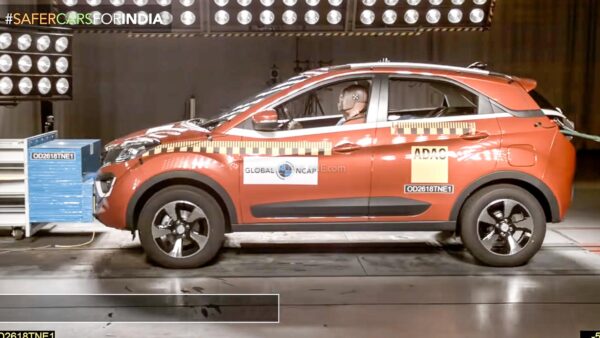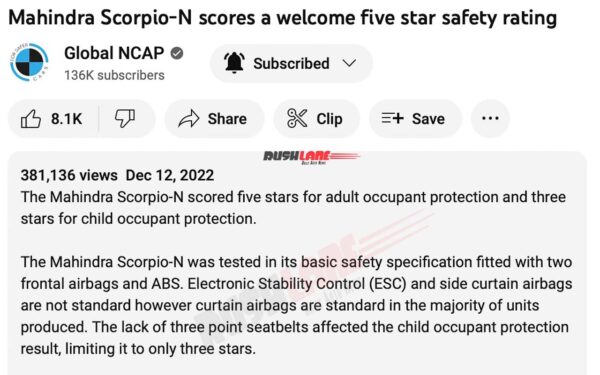Retesting cars with low ratings raises questions about Global NCAP, especially when several other popular cars have never been tested

While NCAP crash test safety ratings for cars sold in India are now key points for discussions, current patterns call into question intent. And recent statements by Global NCAP officials don’t help alleviate these doubts either.
The need for overall safety on our roads is paramount keeping in mind the high number of fatalities reported each year. And no, there’s no test or protocol that points us to clarity regarding cessation of fatalities owing to safer cars. Here’s a look at recent road accidents listed as per type of collision and type of impacting vehicle.
Selection of test models
Global NCAP has started testing cars, as per new safety protocols. The first to be tested under the new protocol were Volkswagen Taigun and Skoda Kushaq, which share the same platform and equipment. Both Taigun and Kushaq received 5-star rating in both Adult and Child safety parameters. They are currently the highest rated cars here in terms of safety, as defined by Global NCAP’s new test protocols.
Now, four new cars have been tested under the new protocols, Scorpio N, Maruti S-Presso, Swift and Ignis. While Scorpio N and Ignis are new in the list, Swift and S-Presso have already been tested before. S-Presso was tested just two years back, while Swift was tested in 2018. This is where doubts start to appear, as there’s no real rationale in retesting cars when there are plenty of top-selling cars that have never been tested.
#SaferCarsForIndia was launched by GlobalNCAP in 2014 with the objective of promoting safer vehicles in the country. To date GlobalNCAP has completed sixty safety assessments which have acted as an important catalyst in the safety improvement of Indian cars. pic.twitter.com/JoUUYbKYG0
— GlobalNCAP (@GlobalNCAP) December 12, 2022
It’s true that GNCAP has tested several Mahindra and Tata products. Cars like XUV700, XUV300, Thar, Scorpio N, Nexon, Punch, Altroz, Tiago and Tigor have been tested and received top ratings. However, the other side of the story is that popular cars like Harrier, Safari and Bolero have never been tested. Surely, consumers are keen. Who really has a say on which cars aren’t tested, as recent re-testing of already low-scoring models suggests some don’t have the privilege of saying which cars should be tested. Of course, all cars will eventually be retested as per new protocols. But the question is why ignore cars that have never been tested? In the case of Maruti, Global NCAP could have tested the Grand Vitara which is their newest car, instead of testing Maruti cars which were already known to have poor safety.
Uniformity in variant selection
Global NCAP’s deliberate misdirection regarding the Scorpio N’s 5-star safety rating needs to be highlighted as it clearly points towards how these safety ratings are not done on a level playing field. While crash tests of other cars are executed on base models with standard safety features, GNCAP chose to test a loaded Scorpio N with optional ESP and side curtain airbags to award its 5-star rating. Yes, the Scorpio N that was crash tested by Global NCAP was not the base model.
Scorpio N base model would have scored significantly less points in the safety evaluation due to the glaring omission of ESP and we are not sure it would have passed the side-impact testing with flying colours without the curtain airbags. A 3-star rating is a realistic possibility of the base Scorpio N but in any case, the maximum it could have achieved without ESP and side airbags is a 4-star rating.

GNCAP justified its choice to test the top-end Scorpio N by saying something extremely vague about the installation rate of ESP and side-airbags on vehicle’s produced but stopped short of quantifying this in-terms of percentage of Scorpio N cars produced with these features on-board. Top-end variants of Kia Seltos sell well and yet the base variant was tested and a 3-star rating was awarded.
It would be nice if Global NCAP can explain why some cars have never been tested. Worse still if this is done at the cost of retesting tested cars. And for now the process of variant selection of the car to be tested looks not transparent or consistent. If GNCAP intends to honour its commitment to making cars safer for India, its test campaign should include an impartial mix of products representing every segment of the market.
Aiming for the stars
What is even more surprising is the choice of words being used by top officials of Global NCAP. The statements appear to be promotional, which is not expected from a supposedly independent organization like Global NCAP. While encouraging top performers is okay, using words like “disappointing” seems personal and directly targeting a particular brand. The ultimate goal is to improve safety for car users, which is where all stakeholders need to focus.
Consumers are smart enough to know which cars have high and low safety ratings. Global NCAP’s crash test ratings are publicly available and quite easy to interpret. The need to glorify specific brands and belittle others simply does not arise, especially from an independent organization like Global NCAP. Currently, G-NCAP testing results are fast making their way as fodder for marketing material, whether company approved or not.

